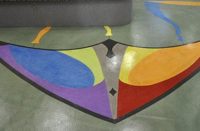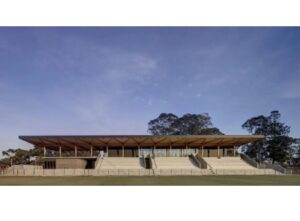As is the story with most contractors, starting a concrete business isn’t always a straight path. For Nick Dancer of Fort Wayne, Indiana, life threw a lot of obstacles in his way but it never squelched his passion.
One such roadblock involved convalescing from a broken ankle that was a result of a motorcycle accident. The unfortunate event upheaved his life and made him lose his job, but he took advantage of this forced downtime to get more training and eventually start his own concrete business.
And then boom. The recession came along and his company was one of the casualties. Still, he never lost his drive.
2012 do-over
Fast-forward to 2012 and he was afforded a fresh start with Dancer Concrete Design. “It was just me and some helpers,” he says.
Since then, the company has grown considerably — nine installers and five support staff — and is now the “go-to guy” for many commercial projects. “We are doing better work today than we ever have and are still looking to grow and improve.”
He’s trained and developed skills with some of the industry’s best such as FuTung Cheng of Cheng Design in Berkley, California, and Jeff Girard with the Concrete Countertop Institute in Raleigh, North Carolina.
“The business started with countertops but now we only do interior flooring,” says Dancer. “What I learned through polishing, forming and sealing countertops, I was able to take that knowledge and complete floors with it.”
Dancer notes that he personally likes the impact a floor has on a space because it’s such a large portion of a design versus a countertop which is just one element in a space. He also loves that with floors you can work with others while a countertop can be more of a solo job.
“I think there’s a higher level of accountability and fun when you get to work alongside others. Instead of a ‘me’ thing, it’s a ‘we’ thing,” says Dancer. “We get to bond together to create something amazing and in some installs we are installing flooring that actually might outlive us.”
A healthy mix
As far as a favorite mix or system goes, Dancer notes that he loves to continuously experiment with products in his studio where he makes most of his samples. “We use a variety of manufacturers and systems for our floors. Instead of just working with one specific company for all installations, we try to switch it up and use the best products for each unique situation,” says Dancer.
Typically, Dancer works with products such as epoxies, urethanes, polished concrete systems and stains on residential, industrial and commercial projects.
“Residential is fun because the homeowners have such a caring mentality,” says Dancer. “They are interested in the process, they have ideas and we get to come together to make something unique for them.”
On the other hand, he enjoys commercial projects because of their size and scope while industrial is more straightforward.
Method over mayhem
To help keep his company focused, Dancer comes up with a slogan each year. This year it’s “method over mayhem.”
“The theme is about planning and preparing instead of just letting things happen,” says Dancer. “It’s about having a clear vision and goals for what we are pursuing.”
When asked about big projects that he’s worked on, he believes people today are conditioned to think that bigger is better and to him it’s not about that. It’s about doing the best work.
“The jobs that resonate with me the most are when our team has come together and had to work on something that we couldn’t do alone,” says Dancer. “Sometimes these are projects that are very aggravating, but we learn and grow from them.”
One of his largest projects to date is the Parkview Field — 30,000 square feet of fully exposed aggregate with lots of edges, corners and detailed work. This was done over a nine-month period, off and on around a minor league baseball schedule. It’s also a top hot spot in Fort Wayne.
“My favorite project is whatever project I am working on at the moment. I don’t want to focus too much on the past and build some sort of ‘back in the day mentality.’ Our focus is to do the best with what is in front of us right now,” says Dancer.
Jobs in the works
Currently Dancer is working on a gymnasium inside of a church, a project he was approached to do a few years back. The original contractor sealed the concrete and painted the basketball lines with paint in lieu of a full polished concrete floor. “Three years ago, this job wasn’t a good fit,” says Dancer, because the organization was low on funds due to other building needs at the time.
This time around, he’s doing it right. Dancer and his team removed the acrylic sealer through grinding, polished the floor, laid out the basketball court design, stained the pattern and applied a stain guard.
Unlike a topical coating that sits on the surface, “The stain soaks into the concrete. It won’t scratch or peel.”
He also notes that the best thing about this job is that he had the opportunity to train and teach others the importance of detailed design work.
One for the team
Some of the biggest challenges Dancer overcame in the last year were scheduling and equipment problems. Three of the largest installs in the history of the company were all happening at the same time.
“Our team stepped up in so many ways. We had guys working Monday through Thursday out of town, then coming back into town and working Friday and Saturday at another job,” says Dancer.
This was a big turning point for the company as the team faced tough decisions with confidence and resilience. He notes that their best skill is the ability to come together as a team.
“We have a team who really cares about the work they produce and they have strong accountabilities to our clients,” says Dancer. “The combination of hard work and caring is our biggest company strength.”
While he may have started this business on his own, he credits much of his success to the people who have and still work with him.
“My team helps me grow and allows me the opportunity to experiment, teach and solve problems as they occur,” says Dancer.
As a final note, Dancer thinks it’s OK to have dreams to grow a business, but it’s also OK to be a successful small business.
“You can be happy where you are but still strive for whatever is the next step at the same time,” says Dancer.
www.nickdancerconcrete.com




























